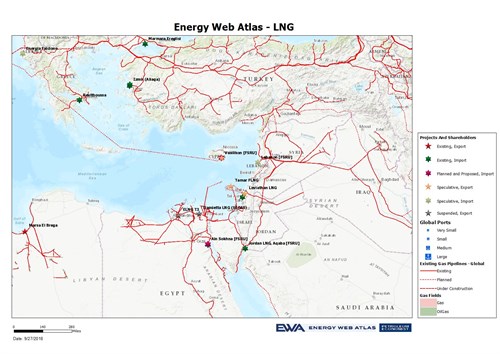Pipeline deal brings export of Israeli gas to Egypt within sight
JERUSALEM (Reuters) - Companies operating in both Israel and Egypt will buy a 39 percent stake in the EMG pipeline to enable a landmark $15 billion natural gas export deal to begin next year, the partners said.
 |
| Source: EWA |
The $518 million purchase by Israel’s Delek Drilling (DEDRp.TA), Texas-based Noble Energy (NBL.N) and the Egyptian East Gas Co will enable the supply of 64 billion cubic meters of gas over 10 years from Israel’s offshore Tamar and Leviathan fields to Egypt as part of the export deal signed in February.
“The partnership intends to act to close the transaction and begin piping natural gas from Israel to Egypt as early as the beginning of 2019,” Delek said in a statement.
Delek and Noble, which are partners in the Israeli gas fields, will each pay $185 million while the Egyptian East Gas Co will pay $148 million.
This comes against the backdrop of Egypt’s efforts to liberalise its gas market and open it up to trading by private companies.
“The ministry welcomes this new step by the private companies responsible for the commercial project’s implementation,” Ministry of Petroleum spokesman Hamdi Abdelaziz said in a statement.
The spokesman added that the ministry is ready to consider permit requests from the private sector to help Egypt become a regional hub for gas trading.
‘HISTORIC TRANSACTION’
To buy into EMG, which owns a 90 km subsea pipeline between Ashkelon in Israel and El-Arish in Egypt, the three partners formed a joint company called EMED.
Egyptian East Gas also owns a pipeline between El-Arish and Aqaba, Jordan, which the EMED companies said could be used to transport additional gas supplies in the future.
“This is a historic transaction, that renders Egypt a regional energy centre and positions it in line with significant global energy centers,” said Delek CEO Yossi Abu.
Shares in Delek Drilling were up 3.6 percent at midday.
The EMG pipeline originally carried gas supplies in the other direction, when Israel was buying gas from Egypt. That deal collapsed in 2012 after militants in Egypt’s Sinai peninsula carried out repeated attacks on the pipeline and EMG sued the Egyptian government for damages.
The pipeline again became an export option after the Tamar and Leviathan discoveries. Tamar began production in 2013 and Leviathan is due to come online in late 2019.
Under the new deal, EMG agreed to end arbitration with Egypt and drop claims against Cairo, Delek said.
At the start-up of the Leviathan field, Noble said it expects to sell at least 350 million cubic feet of natural gas per day to Egyptian customers.
Other shareholders in EMG are Thai energy company PTT (PTT.BK), state-owned Egyptian company EGPC and investment group MGPC. Egyptian East Gas holds a stake on its own.
Delek and Noble have also signed deals to export gas to Jordan.
Reporting by Ari Rabinovitch and Tova Cohen; Additional reporting by Ehab Farouk; Editing by David Goodman

- RWE strengthens partnerships with ADNOC and Masdar to enhance energy security in Germany and Europe
- TotalEnergies and Mozambique announce the full restart of the $20-B Mozambique LNG project
- Venture Global wins LNG arbitration case brought by Spain's Repsol
- KBR awarded FEED for Coastal Bend LNG project
- Norway pipeline gas export down 2.3% in 2025, seen steady this year



Comments